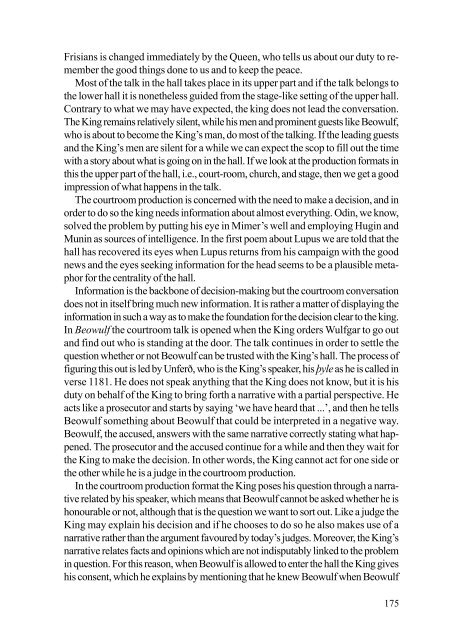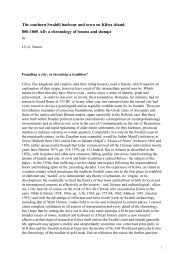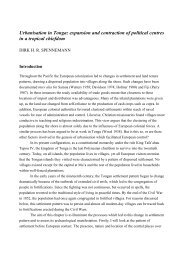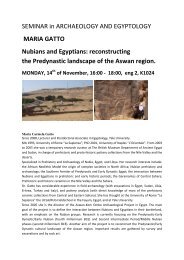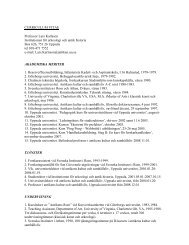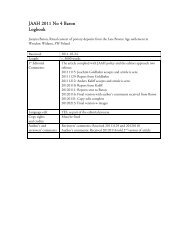Beowulf - Institutionen för arkeologi och antik historia
Beowulf - Institutionen för arkeologi och antik historia
Beowulf - Institutionen för arkeologi och antik historia
You also want an ePaper? Increase the reach of your titles
YUMPU automatically turns print PDFs into web optimized ePapers that Google loves.
Frisians is changed immediately by the Queen, who tells us about our duty to remember<br />
the good things done to us and to keep the peace.<br />
Most of the talk in the hall takes place in its upper part and if the talk belongs to<br />
the lower hall it is nonetheless guided from the stage-like setting of the upper hall.<br />
Contrary to what we may have expected, the king does not lead the conversation.<br />
The King remains relatively silent, while his men and prominent guests like <strong>Beowulf</strong>,<br />
who is about to become the King’s man, do most of the talking. If the leading guests<br />
and the King’s men are silent for a while we can expect the scop to fill out the time<br />
with a story about what is going on in the hall. If we look at the production formats in<br />
this the upper part of the hall, i.e., court-room, church, and stage, then we get a good<br />
impression of what happens in the talk.<br />
The courtroom production is concerned with the need to make a decision, and in<br />
order to do so the king needs information about almost everything. Odin, we know,<br />
solved the problem by putting his eye in Mimer’s well and employing Hugin and<br />
Munin as sources of intelligence. In the first poem about Lupus we are told that the<br />
hall has recovered its eyes when Lupus returns from his campaign with the good<br />
news and the eyes seeking information for the head seems to be a plausible metaphor<br />
for the centrality of the hall.<br />
Information is the backbone of decision-making but the courtroom conversation<br />
does not in itself bring much new information. It is rather a matter of displaying the<br />
information in such a way as to make the foundation for the decision clear to the king.<br />
In <strong>Beowulf</strong> the courtroom talk is opened when the King orders Wulfgar to go out<br />
and find out who is standing at the door. The talk continues in order to settle the<br />
question whether or not <strong>Beowulf</strong> can be trusted with the King’s hall. The process of<br />
figuring this out is led by Unferð, who is the King’s speaker, his þyle as he is called in<br />
verse 1181. He does not speak anything that the King does not know, but it is his<br />
duty on behalf of the King to bring forth a narrative with a partial perspective. He<br />
acts like a prosecutor and starts by saying ‘we have heard that ...’, and then he tells<br />
<strong>Beowulf</strong> something about <strong>Beowulf</strong> that could be interpreted in a negative way.<br />
<strong>Beowulf</strong>, the accused, answers with the same narrative correctly stating what happened.<br />
The prosecutor and the accused continue for a while and then they wait for<br />
the King to make the decision. In other words, the King cannot act for one side or<br />
the other while he is a judge in the courtroom production.<br />
In the courtroom production format the King poses his question through a narrative<br />
related by his speaker, which means that <strong>Beowulf</strong> cannot be asked whether he is<br />
honourable or not, although that is the question we want to sort out. Like a judge the<br />
King may explain his decision and if he chooses to do so he also makes use of a<br />
narrative rather than the argument favoured by today’s judges. Moreover, the King’s<br />
narrative relates facts and opinions which are not indisputably linked to the problem<br />
in question. For this reason, when <strong>Beowulf</strong> is allowed to enter the hall the King gives<br />
his consent, which he explains by mentioning that he knew <strong>Beowulf</strong> when <strong>Beowulf</strong><br />
175


